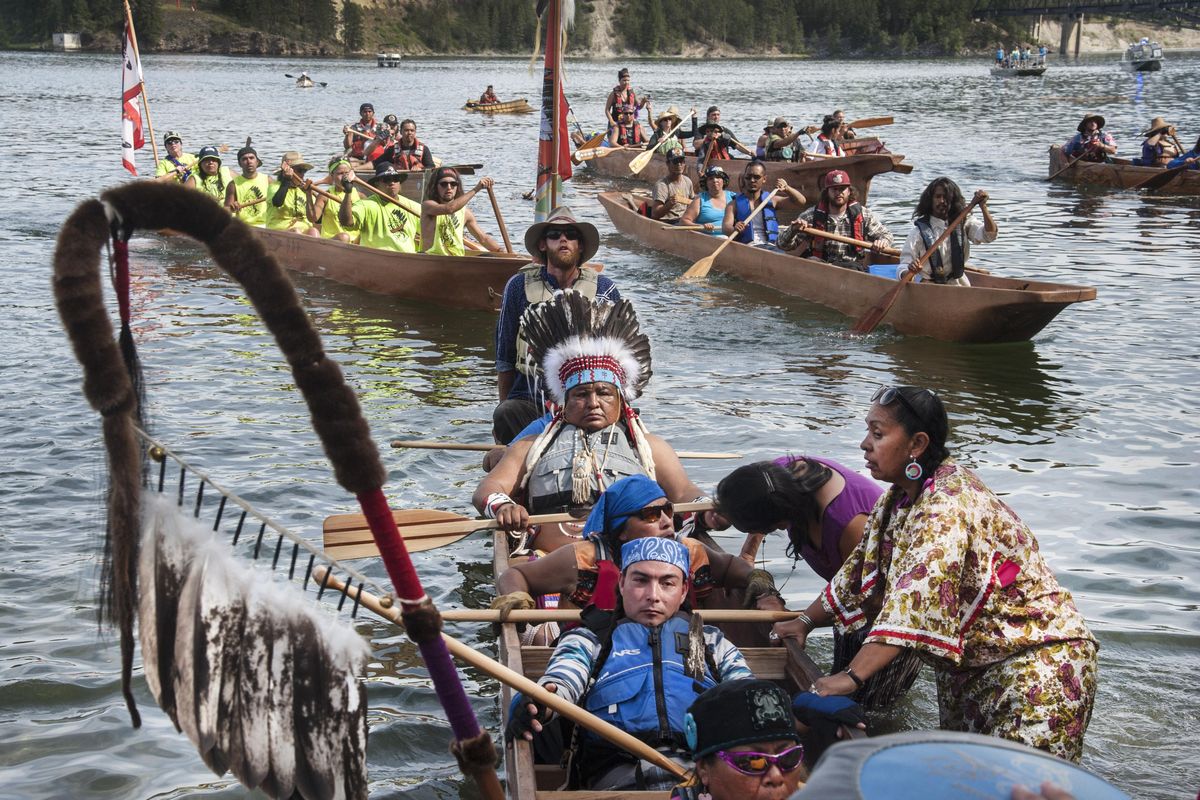Tribes end canoe journey at Kettle Falls, celebrate hope of salmon’s return

KETTLE FALLS, Wash. – As paddlers from Inland Northwest tribes gathered for the final stretch of a canoe journey to Kettle Falls, an ancient fishing site on the Columbia River, the present seemed to blur into the past.
The canoes launched near “Sharpening Rock,” where Native Americans once honed the blades of fishing spears. From across the river, the paddlers could hear singing and drumming from Harder’s Landing, where they would end their trip.
“I feel like they’re calling us,” said Gina Lawrence, a member of the Confederated Tribes of the Colville Reservation, whose son was one of the paddlers.
About 300 people waited on the beach Friday afternoon to welcome the paddlers from the Colville, Coeur d’Alene, Spokane, Kootenai and Kalispel tribes, who made journeys similar to the trips their ancestors might have taken around the summer solstice to fish for salmon at Kettle Falls.
There were songs, prayers and cheers as the dugout canoes were carried ashore. While gifts of huckleberry jam, canned salmon and bundles of cedar were exchanged, a bald eagle soared overhead.
“I have tears of joy,” said Vincent Peone, one of the paddlers from the Coeur d’Alene Tribe. “We’re praying for the salmon to come back. We believe we are the salmon people.”
It’s been at least 80 years since the five tribes had a similar gathering at Kettle Falls, said Shelly Boyd, a member of the Colville Tribe and one of the organizers of the weekend’s events.
Grand Coulee Dam’s construction in the 1930s without fish ladders blocked salmon migration to the Upper Columbia River and submerged Kettle Falls, one of North America’s most prolific salmon fisheries. The 550-foot dam, which helped bring electricity to the region, was considered too tall for fish ladders.
But unlike the 1940 “Ceremony of Tears” that marked the loss of the salmon, Friday and Saturday’s gathering was a hopeful event. The tribes are working with Canada’s First Nations on efforts to build political support for reintroducing salmon above Grand Coulee. The Spokane Tribe recently received $200,000 to study potential salmon habitat above the dam. Other studies have begun looking at ways to address the technical challenges of fish passage at high dams.
“You’re seeing history unfold in our lifetime,” said Dan Nanamkin, a member of the Colville Tribe. “Who knows? Maybe someday the salmon will make it back up the river.”
To call attention to the salmon restoration effort, the Upper Columbia United Tribes purchased cedar logs from the Quinault Indian Nation in Western Washington last year. The five tribes made dugout canoes for the trip, launching from their home territories.
Brandon Finley, a member of the Colville Tribe, started the trip Tuesday with eight other paddlers in a canoe carved from an 800-year-old cedar tree. They launched near Castlegar, British Columbia, in recognition of ancestral lands that extended to Canada’s Arrow Lakes region.
Most of the paddlers were “completely green,” Finley said, but they quickly picked up the skills and teamwork needed to paddle safely through a 20-mile stretch of rapids near the international border.
Other canoes paddling north to Kettle Falls faced 4-foot swells and headwinds during stormy weather earlier in the week. But for the paddlers, the struggles of the journey mirrored the arduous migration of the salmon.
“This brings me even closer to the river,” said Travis Adams, who paddled 45 miles upstream over three days. “My people, my tribe and my family were people of the Columbia River.”
Boyd heard stories about Kettle Falls from her great-grandmother, who traveled by horse and buggy to fish for salmon at the falls.
Helen Toulou Perkins was born in 1876 on the Colville Reservation, when the Columbia River still teemed with fish and tribes from all across the region gathered at Kettle Falls. Salmon were important to the tribes’ diet, spirituality and culture.
After the long winter, “everyone would be hungry when they came,” Boyd said. But the harvest was managed carefully to ensure the salmon stocks weren’t overfished, she said.
“In June, they could only catch fish with spears,” Boyd said.
As the salmon runs increased throughout the summer, other types of harvest were allowed. And when the salmon runs were poor, “they knew they would be facing starvation” that winter, Boyd said.
On Saturday morning, the tribes’ members gathered at the river for a salmon ceremony. They each picked up two smooth stones to clap together during singing and prayers, making the tumbling sound of rocks that salmon hear in the river.
At the salmon ceremony, Boyd announced plans for another canoe journey. Members of the tribes already are talking about paddling downstream to the mouth of the Columbia next year. The trip will to call attention to other critical issues facing the river, including polluted water and climate change.
“We’re going to the ocean next year,” Boyd said. “This river is important to the world; it’s a major artery for the ocean. As people of the river, we’re still responsible for it.”